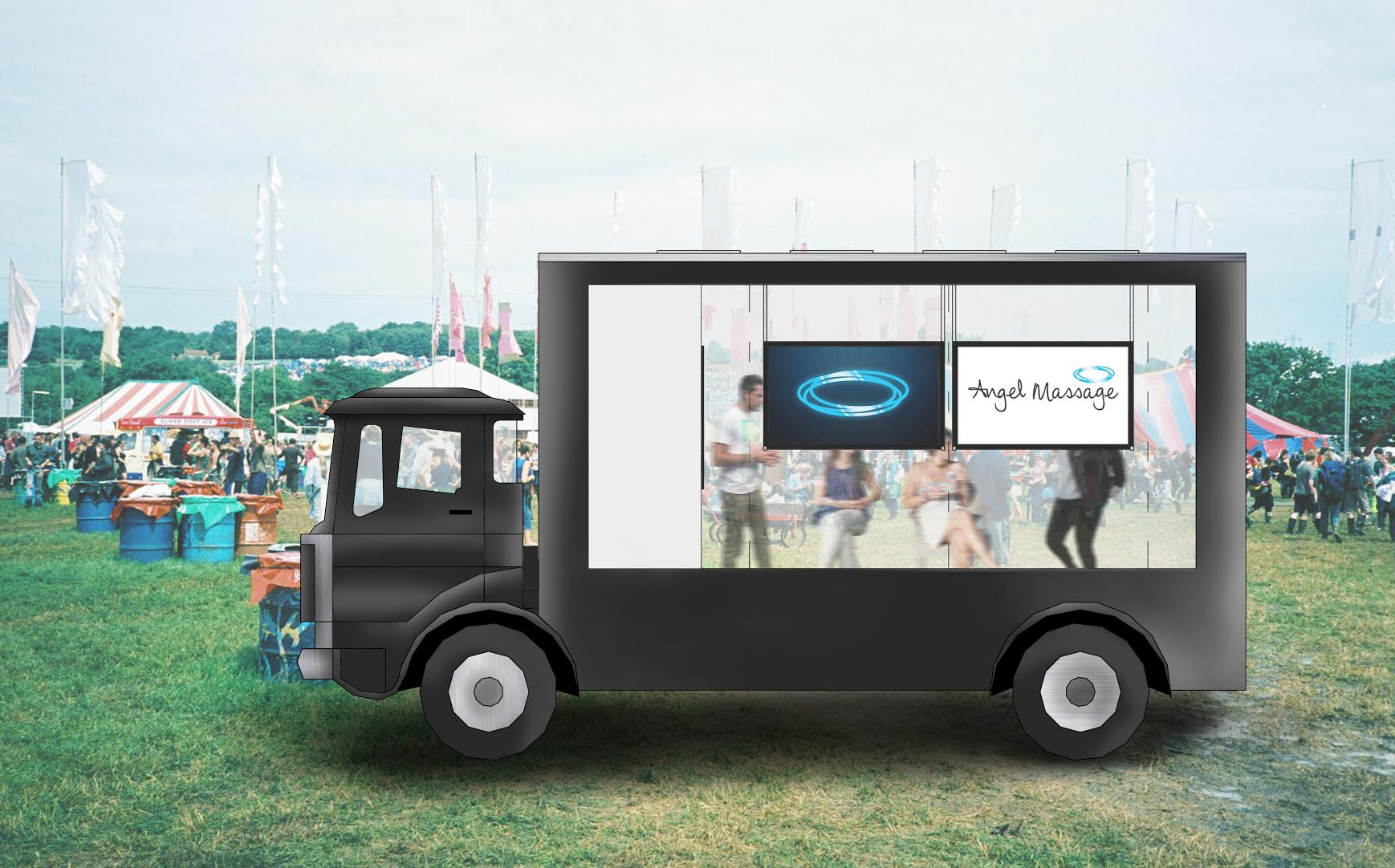
3 Minute Angels - Devine Truck
Pitch your Startup, App or Hardware or post a Startup Event or Startup Job
 ED: Who is Andrew Ward? “Wardy” has been an active campaigner about the benefits of Crowdfunding to Government, Treasury and CAMAC as well as a fundraiser for Rare Cancers cutting half his dreadlocks off and wearing a rare cancers T-shirt for a month. He’s used rewards crowdfunding campaigns to support the creation of an app around healthy venting and has assisted a dozen or more friends with their crowdfunding campaigns.
ED: Who is Andrew Ward? “Wardy” has been an active campaigner about the benefits of Crowdfunding to Government, Treasury and CAMAC as well as a fundraiser for Rare Cancers cutting half his dreadlocks off and wearing a rare cancers T-shirt for a month. He’s used rewards crowdfunding campaigns to support the creation of an app around healthy venting and has assisted a dozen or more friends with their crowdfunding campaigns.
When he’s not crowdfunding, he is the CEO of 3 Minute Angels, which focuses on short massages for corporate clients, Angel massage that does full body massages and Get Angels Now, which connects customers with nearby spas and therapists.
Can Any Business Use Crowdfunding?
Nowadays the short-hand for reward crowdfunding is: Kickstarter.
Platforms like Kickstarter and Indigogo have helped many people with passion, talent or a worthy causes raise much needed funds for their project.
Companies producing a cool business to consumer products like Flow, Pebble Watch or Coolest Cooler use crowdfunding as a first port of call when getting off the ground.
However, more traditional, already established SME’s (Small and Medium Sized Businesses) by and large have steered away from these sites because unless the organization is a not-for-profit, most backers would rather see commercial ventures look after themselves.
Businesses that have other businesses as customers face increased issues because crowdfunding is pledges and rewards not purchase orders, quotes, accepted terms and service level agreements. Businesses crowdfunding from other businesses is a virgin area.
The Divine Truck – Mobile Massage Experiment
So, I’m running an experiment with one of my own businesses in the massage industry, 3 Minute Angels, to see what I can learn firsthand. We are launching the Divine Truck crowdfunding campaign, a mobile massage platform for festival, community events, school fund raisers and corporate events.
To see if rewards crowdfunding can be used as a pre-sales tool. I’m hopeful I’ll find a way of validating ideas, reducing risk and engaging customers all at once with the result being a continued successful business.
Allow me to give you some details and back-story for context. My goal is to take fans of my current products and have them be funders of the next. However, I realize that only a small portion of people will back a project compared with the number who look at it. So for most of the communication I need to treat this as a marketing activity.
As with any marketing activity you have to know your target market and in this case my target is my existing customers, their staff and various fans of massage. For all of these people I have access to them via email and most of them via social media. Simply put, they already are familiar with my brand. Attracting people outside of this core would be nice, but not essential.
Knowing who your target market is makes self-hosting an attractive option. The theory I’m working with is that when crowdfunding to your previous customers who you have a relationship with, you will have an easier time getting them onto your own site than a crowdfunding platform that they may or may not have heard of.
Self Hosting
Self-hosting is an appealing product for SME businesses but apart from Pozible, it’s hard to find many platforms that offer self-hosting for raisers.
As a business with a crowdfunding campaign on your own site you have a greater degree of flexibility with how you present your campaign. You can for instance have “live chat”, multiple video rich presentations, marketing opt-ins to other products and complete control of look and feel. This just simply isn’t possible for crowdfunding platforms to provide on their site, but is made possible through self-hosting.
Live Chat within your own website allows you to handle any confusion your customer has about the campaign, offer or reward they are investigating. By offering a solution right there and then you can increase conversion rates of interest to pledge.
In our case it has been really interesting watching people who come in on the crowdfunding campaign links but then go to our event and corporate offerings to check them out. It’s only been a week so statistics on broader sales increase are not yet sound, but by month end we should know if this has had an impact (or not) on existing product sales.
There is very little technical know-how required to do self-hosting. The method for doing it is simply to create a campaign goal timeline, rewards, and parameters as you would normally. We chose Pozible over others because of the subscription rewards feature. With Pozible you simply imbed code and paste into your own page. Simple.
Rewards
Rewards are central to a traditional crowdfunding campaign and so far they are proving as important when a business is making the offering to its network.
For example, 3 Minute Angels is a massage “supplier” to larger businesses that have lots of staff. The purchase decision is from a “key contact” who is not going to experience most of the product. This contrasts with most people’s idea of massage where they pay a therapist or a spa for a personal massage service that they receive.
Another portion of our database are previous full body massage clients. These are people that have worked with our Angel Massage business. They have usually purchased the massage for themselves or for a loved one.
As such, we have segmented the rewards in our campaign so that there is appeal for Businesses and Consumers within the campaign.
For B2C crowdfunding campaigns the most frequent reward value on Pozible is $50. We have rewards priced at $1, $50, $75, $200/week and $500. I’ll discuss the $200 week reward soon when covering subscription rewards.
What we have already noticed from the first week of pledges is that the B2C rewards, where pledgers get a personal massage are weaker than expected and the strongest reward category is actually $500. The $500 reward is probably attractive because it’s a reward that saves the client at least $1000 if they were to buy later.
However, it’s noteworthy that the B2B price point is working at 10x the price point of the B2C prince point.
Pre-Selling and Subscriptions
Inherently we understand that crowdfunding is actually a pre-sales tool and a research tool that enables you to work out if this is a business idea worth pursuing. This is more valuable often than the money raised.
I can’t talk with experience about other platforms, but with Pozible self-hosting you can pre-sell “subscription rewards”. The nominal value of a subscription reward is usually less than your normal retail prices would be, which encourages clients to pledge now, but also be subscribed to pledge again (weekly monthly or annually).
The subscription rewards are great in theory because you can offset the margin with regularity right up front. In practice, despite the savings offered in this reward type, it hasn’t yet been taken up. It’s too early to call but perhaps business 2 business subscription crowdfunding is a bridge too far.
It’s simple to install subscription rewards when setting up your campaign. All you need is a Stripe account and then your recurring payment collection is setup when the Reward is first established. Clients would be required to setup a Stripe account too.
Risk and Margins
Bringing together a new product with your fans-as-funders is an incredibly exciting relationship building exercise. It is not unreasonable to expect such an activity to give you long lasting brand value well after the campaign is finished. Of course, there could be downside risks too.
As we have seen in many cases with B2C crowdfunding on novel gadgets when a person with an idea gets a lot of pre-sales and money they then have the issue with delivering what they sold. Just think of the issues Tile went through delivering their rewards (finally). For more Crowdfunding Fails see this Gizmodo article
You should also consider these sales in light of your reduced margin. Whilst you want enough of these sales to validate the idea and spearhead growth. You don’t want to commit your next 6-months of capacity to zero margin business unless this is a planned event.
As a business organization you should at the very least be able to deliver the rewards that are promised. If you don’t, the “crowd” (i.e your customers) may go from supporters to being an angry mob.
When Will The Experiment Finish
Right now it’s a week into the 3 Minute Angels Divine Truck campaign. We’re sitting just under 40% of the funding goal achieved. We have a second round of communications to our database coming up this week and think we may end up with some PR.
At the end of the month we will be closing the campaign – perhaps we will have hit our funding target and will be on the road to building a new product. Or potentially we will have fallen short or smashed the target.
I honestly do not know…
However my promise to you is to let you know how it goes.
If you have any enquiries contact [email protected]
To see the campaign www.3minuteangels.com/the-divine-truck
Pitch your Startup, App or Hardware or post a Startup Event or Startup Job